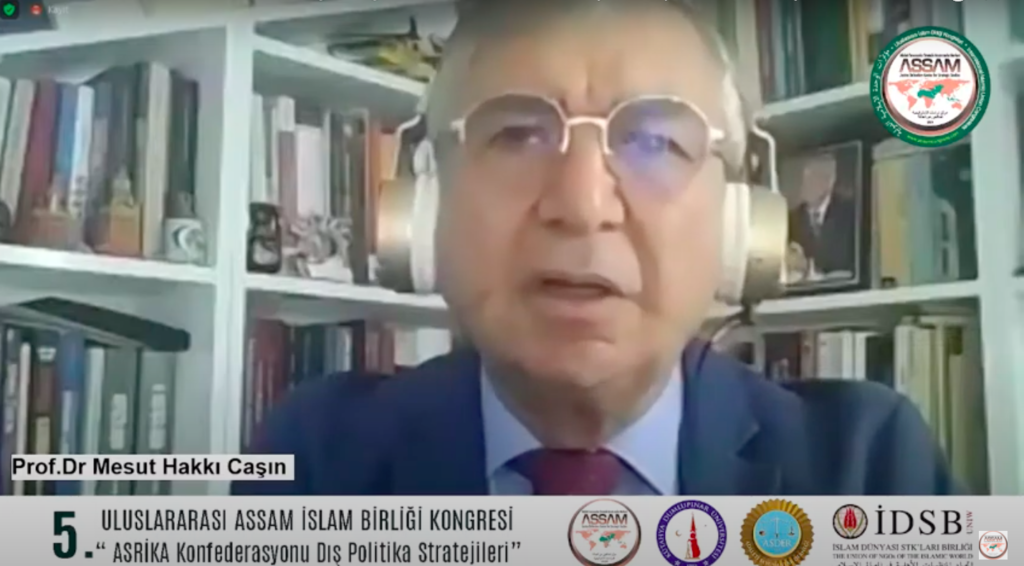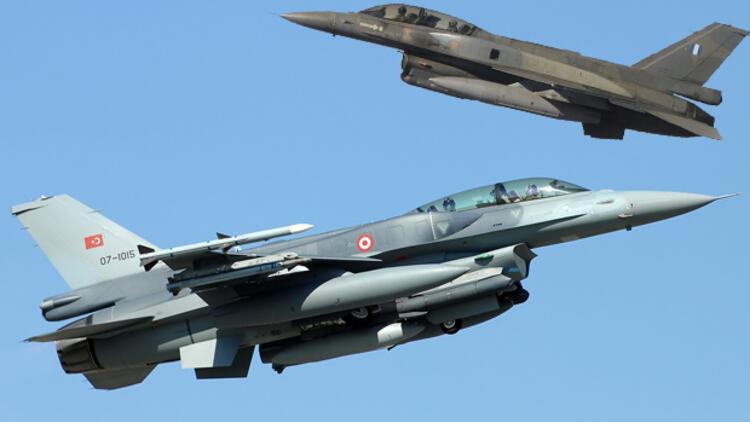Levent Kenez/Stockholm
Mesut Hakkı Caşın, the Turkish president’s advisor on security and foreign policy, has stated that the balance of power between Turkey and Greece changed after Western military assistance to Athens, adding that the Turkish military’s job has become more difficult.
A former air forces officer, Caşın also said air superiority has passed to Greece following its purchase of new fighter jets. The statements of Caşın, who often belittles Greece on Turkish TV shows, also contradict Turkey’s longstanding assertion that the Turkish Armed Forces are far superior to those of Greece.

Caşın in December attended the annual Islamic Union Congress organized by the Association of Justice Defenders Strategic Studies Center (ASSAM), a front organization run by private military contractor SADAT, which many believe is a de facto paramilitary force loyal to Turkey’s Islamist president, Recep Tayyip Erdoğan.
Starting his online presentation by saying, “May Allah not separate us from righteousness.” Caşın said the “arms assistance to Greece” scares him the most.
“Look, in addition to the fighter jets, four modern American frigates were given to Greece. France also provided four. Four MEKOs [German-made frigates] in the inventory are being modernized. With these 12 warships, American-Greek cooperation has been challenging us in the Aegean and eastern Mediterranean. There are 20 US military bases in Greece. We see that Turkey has difficulties in Alexandroupoli and Crete,” Caşın told viewers.
However, there’s only one actual US base in Greece, at Souda Bay. American forces have been granted access to four additional Greek bases according to a new defense cooperation agreement signed in October.
Caşın said air superiority has shifted towards Greece with the help of the new fighter jets. He also drew attention to Israel training the Greek Air Force at Kalamata Air Base.
“It is not yet clear what Turkey can do against an attack by the Greek army, which is prepared to intervene in Thrace and the Aegean,” he said.
Criticizing the recent joint military exercises between Greece and the US in the Aegean last November, Caşın said it was carried out with much more personnel and ships than needed and that this was not a good omen for Turkey. He also claimed that Greece has become an American garrison.
Greece purchased 18 Rafale jets
In January 2021 Athens purchased 18 Rafale jets, 12 of them second hand, for 2.5 billion euros and added six more to the order in September 2021, bringing the total to 24. Turkey is concerned that it may be on the verge of losing its air deterrence against Greece, especially after it was expelled from the F-35 Joint Strike Fighter program over Ankara’s purchase of S-400 long-range missiles from Russia despite opposition from the US, a NATO ally.
Video of Caşın’s presentation on the military balance between Turkey and Greece.
Turkey is currently in talks with the US to purchase 40 Lockheed Martin F-16 jets and nearly 80 modernization kits to upgrade its F-16 fleet. It is unknown whether the US Congress will approve Turkey’s request given the anger towards Turkey over its rapprochement with Russia.
Nordic Monitor previously reported that the Turkish Air Force is set to train with Qatar’s French-made Dassault Rafale jets to counter the Greek military, which has increased its air force capabilities with the newly acquired Rafale fighter aircraft
According to documents obtained from a Turkish parliamentary committee, one of the reasons for Turkey’s push to strike a military training agreement with Qatar was to familiarize its air force with the Rafale fighter jet’s capabilities in a bid to a perceived threat posed by the Greek Air Force in the Aegean and Mediterranean.
The military agreement, signed by the chiefs of staff of both countries in March 2021, allows the temporary deployment of up to 36 Qatari military aircraft and up to 250 personnel to Turkey.

In addition to not being able to purchase new-generation fighter jets, Turkey is going through the worst days in its history in terms of well-trained air personnel. NATO’s southern flank was dealt a huge blow by the government of Turkish President Erdoğan that has seriously degraded Turkey’s air force with a massive purge of hundreds of pilots and thousands of ground personnel from the service on fabricated charges of terrorism following a controversial coup attempt in 2016.
The Turkish Air Force was already in distress before 2016 thanks to a bill in 2012 that facilitated the departure of pilots who chose well-paying jobs in the private aviation industry. The General Staff had to put pressure on Erdoğan to reverse the bill and eventually succeeded in getting an amendment in 2014 to slow the bleeding of the force.
But the damage had been done in the meantime, with 251 pilots asking for retirement or resigning under the 2012 law, which shortened compulsory service to 13 years. The unexpected purge of hundreds of pilots in the summer of 2016 made it worse for the air force, grounding many warplanes without pilots to fly them. The Turkish Air Force — which concluded in a study months before the attempted coup that the loss of pilots was a national security risk for Turkey — was crippled with the unprecedented purge of pilots by the Erdoğan government with no effective administrative, military or judicial investigation into any wrongdoing whatsoever.
The air force in 2017 recalled 1,040 military pilot candidates who had been eliminated in previous tests. Eight hundred thirty of them reportedly passed the competency test and were trained to become military pilots.
In an effort to remedy the shortage, the Turkish government also issued a call in 2017 to former fighter pilots, most of whom work in civil aviation. Only 40 of the 300 former pilots responded to the call to return to duty.












